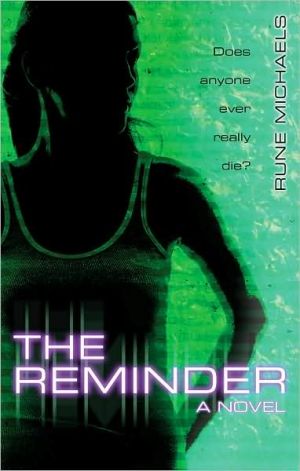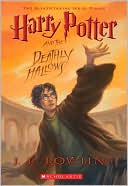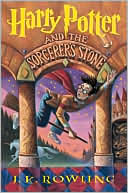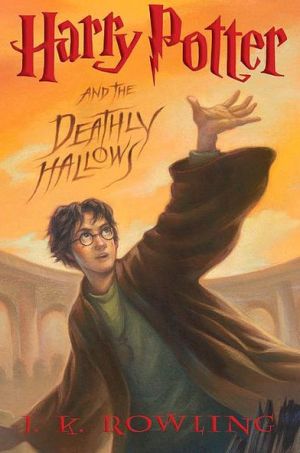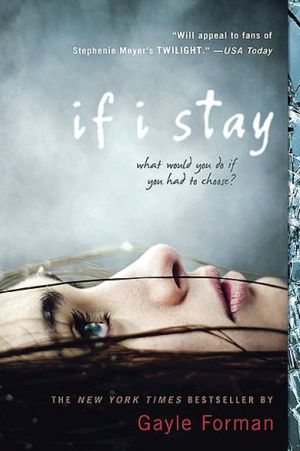Reminder
Daisy, otherwise known as Daze, hears her dead mother’s voice—and this time it’s not coming from an old home movie her brother is watching, or from her own troubled mind. This time Daze has discovered her scientist father’s latest secret project: a lifelike replica of her mother’s head that looks, talks, smiles, and even moves just like Mom. But when Daze’s dad starts seeing another woman and wants to dismantle the project, Daze tries to do what she couldn’t years ago: save her mother’s life....
Search in google:
Daisy, otherwise known as Daze, hears her dead mother's voice. Sometimes it's because of her dad, who likes to watch old home movies when he can't sleep. Sometimes it's because of her brother, who is too young to remember Mom, and needs to be reminded by looking at photographs and watching videos. Sometimes it might just be her mind trying to work out what her therapist would call "issues." But this time, it’s none of those things. It’s something much more wonderful and much more terrifying, something Daze never thought possible. And it might allow her to do what she couldn't years ago: save her mother's life.KLIATTDaze hears her mother's voice in the living room. This would not be unusual except that her mother died some two years ago. Daze, her father and her little brother Ryan have moved to a new house and a new school where Daze's stories about her mother's illness and treatment get her some attention and much sympathy. But she has troubling nightmares, and when she hears her mother's voice she hopes for an instant that what had happened had not happened. In the living room her dad is showing family movies of her mom and Daze when she was a baby. It is a bittersweet moment that turns eerie when she hears her mother's voice in her father's workroom at the university. Daze realizes that her father has developed an artificial intelligence that uses a replica of her mother's head and the sounds of her mother's voice. She arranges her schedule so that she can spend time in the workroom with her artificial "mother" and there overhears that her father has started to see another woman. Daze has a desperate need to hold onto the prototype and goes to great lengths to make sure that Ryan gets a chance to meet his "mother" before her father reclaims the robot and the program that operates it. This is a tightly written, poignant story about loss and truth. Daze's loss and her reactions are heart wrenching, but it is not until the end that readers come face to face with the reality of Daze's nightmare. Reviewer: Janis Flint-Ferguson
1 \ The first time I heard my dead mother's voice, there was a logical explanation.\ It was the middle of the night, naturally — that's when ghosts tend to visit. I woke up from a familiar nightmare, gulping down air, my face damp with sweat, my heart hammering, visions of blue and green slipping away as I grabbed darkness gratefully instead.\ Then I heard it again, like I must have heard through my sleep.\ Mom's voice. Mom's laughter, rippling under my bedroom door along with the sliver of light from the living room.\ It suddenly seemed cold under the duvet, under the quilt, inside Mom's old nightgown with a picture of a roaring tiger on the front.\ Then I got a firm grip on myself. I was being stupid. Mom's ghost wasn't out there, chatting with Dad over a late-night movie. There had to be a logical explanation. So I jumped out of bed, scuttled to the door, put my ear to the wood, and listened for a while.\ It was Mom's voice, all right. She was laughing and chatting. She was talking to a baby.\ Talking to me.\ I glanced again at the flicker of light from the living room and everything made sense.\ Not a ghost. Home movies.\ I was relieved, but disappointed as well. If Mom were haunting us, I'm sure she wouldn't be scary — well, not on purpose — and there were a lot of questions I would ask before throwing holy water at her. Besides, you can say good-bye to a ghost. You can't say good-bye to a coffin.\ Dad was slumped on the sofa, a computer keyboard resting in his lap, his hand on the sofa arm. The laptop was humming on the coffee table next to the projector. On the wall, Mom's face. For a moment a close-up, then the camera zoomed out to show her lying on the floor, holding me up. I was waving my hands and kicking my feet, shrieking with joy — or fear — and Mom laughed.\ I watched from the door a few seconds. Then I tiptoed inside, climbed over the back of the sofa, and curled up next to Dad.\ Dad's keyboard dropped to the floor. "Daze...," he said.\ I put a finger to my lips, frowned just like Mom used to do when she told me off for something, and nodded toward the screen. Dad hesitated, then shrugged. He reached for the comforter that lay folded on the armchair, threw it over my bare legs, and together we watched more of Mom smiling, me shrieking.\ The camera stayed on the shelf when Mom was sick. So our movies only show her healthy and happy. All of us, healthy and happy.\ When she left, she took bits of us with her. Bits of me and Dad and probably Ryan, too, even though he doesn't remember her. He wasn't even three when she died. So maybe she didn't exactly take a piece of him with her, he just never got the bits he was supposed to get. Maybe that's why he doesn't remember, or maybe it's the other way around. It's hard to tell.\ I'd seen our home movies before. I sometimes watch them when I'm home alone. Every now and then I make Ryan watch them, because I want him to remember what Mom looked like and sounded like, how she'd let her hair fall over her face when she was shy of the camera, and how she sometimes giggled just like a little kid.\ Sometimes Ryan will see a picture in our computerized photo album, some strange woman, an old friend of Mom and Dad, and he'll ask, "Is this Mom?" — just because her hair is the right color or she's smiling as widely as Mom used to do. It drives me crazy. It makes me want to kick him, honestly, but I'll just yell, and then I show him a whole lot of real pictures of Mom. And then I test him, again and again, making sure he can tell her apart from strangers.\ The home movies are mostly of me and Ryan. Sometimes I have to do a lot of searching before I find a decent segment with Mom in it. But playing on the screen now was something new. Dad had made one movie, spliced together just with segments of Mom.\ Mom looked real, alive. I could almost smell the cherry of her favorite shampoo as the breeze lifted her hair. But the pictures shifted quickly. Her hair changed in color, grew in length, shortened again. Her clothes changed, and I grew bigger, then Ryan was born, and he got bigger too. The color of the walls changed, the arrangement of the furniture. Time passed faster and faster as we approached the present. The last images were from Ryan's second birthday, and there were only a few seconds of Mom, sitting in the living room in our old house, staring into the flames in the fireplace while Ryan squatted on the floor at her feet and dug imaginary sand with his red beach shovel.\ Then the film was over, and after a while Dad's screen saver came on. Just squirming fractals, nothing cute or funny. Not that I was in the mood for cute and funny. My throat felt tight. I kept staring at the blank screen.\ Dad didn't say anything either. He just reached for his laptop, disconnected the projector, and after a few moments he was typing away. I stretched for a look at his screen. His fingers raced over the keyboard, producing lines and lines of complex computer code. It wasn't a programming language I recognized at all. Since Mom died, Dad's always working. And when he's not working, he's thinking about work.\ But he didn't tell me to go back to bed, which meant he wasn't really thinking only about work.\ Slowly the feeling of Mom faded from the room, and so did the lump in my throat.\ "Nice movie," I said, forcing myself to sound cheery. "It will be good for Ryan. He needs something like this. It's tricky, helping him remember, isn't it? Brain like a sieve, that kid."\ "Hmm?" Dad glanced up. "Yes."\ "Best of Mom," I said. "Did you make it for us?"\ "Of course." Dad smiled, his eyes again on the computer code. "Who else?"\ "I miss her," I said, and the lump was back.\ Dad nodded. "We all do." He hesitated, stared at me and then at his screen, but then he clapped the laptop shut, put it on the coffee table, and held out his arms. I crawled closer and put my head on his shoulder. A few small tears wet his shirt.\ There aren't many tears left for Mom anymore, which is scary. In the beginning I thought they would never end. I was crying all the time. I woke up in the morning, and for a second I wouldn't remember, then it came back, like this heavy black blanket was hovering over my bed, just waiting for me to wake up before it descended, wrapping around my head, suffocating me.\ Then one day the blanket wasn't there. I woke up, went to school, and only when I was walking home did I remember. I hadn't forgotten Mom was dead. I'd just forgotten to feel bad.\ "Your face is warm," Dad said. "Did you have another nightmare?"\ "Uh-huh."\ "Want to talk about it?"\ "I don't remember." I muffled into Dad's shirt. "Mom woke me up. I was having a nightmare, and then I woke up and heard Mom's voice, and I thought it was a ghost."\ Dad pushed the hair away from my face. "That's silly, Daze. Do you believe in ghosts?"\ I shook my head. "Yes."\ Dad chuckled. "Which is it?"\ "I don't know. I'm reserving judgment until I meet one."\ "Interesting strategy."\ "Do you believe in ghosts, Dad?"\ Dad looked at the empty projector screen and sighed. "Sometimes I think we're all ghosts."\ We moved after Mom died. I told everybody at my new school about her. I'd told them how she'd been really sick for a long time and then died. I told them about chemotherapy and radiation, about hair loss and wigs, stomach tubes and IVs, about white hospital rooms and beeping monitors.\ My stories were popular. Everybody thought it was all very sad, but they secretly thought it was exciting, too. At least, I think they did. So I told them more. I told them about Mom's white face in the hospital bed, how tired she looked just before she died, and how peaceful she looked after, finally free from the pain. I told them about her last words, how she'd left us a letter for when we were older, saying how much she loved us and how proud she was of us. I told them about how her eyes seemed big in her thin face, and I told them about the way her hand in mine had slackened as she died. I told them about me and Dad sitting there by the bed, holding her hand as it grew cooler, and I told them about kissing her cheek for the last time, drawing the curtain around her bed, and leaving the room.\ Mom died on a Tuesday. At first the world was frozen. I didn't go to school the rest of the week. Ryan went to day care. He didn't understand. I told him Mom was dead. I told him she'd never come back, and he didn't understand, but he cried. He cried for a few minutes.\ Then he stopped crying and went back to his toys, and then after a while he'd ask again, "Where's Mom?" I got so angry I wanted to hit him, but I slammed the door to my room instead and told him to leave me alone. Dad was in his study, I was in my room with the door closed. And Ryan walked between our rooms, knocking at my door, whining to Dad. Dad was frozen too, everything was frozen, so Ryan went back to his own room and played with his toys, and in the morning Dad and I took him to day care and in the afternoon he didn't want to come back home.\ Ryan stopped asking about Mom before she was even buried. At first I wanted to stay home during the funeral. I didn't want to go, so I offered to stay behind and look after Ryan. But Dad shook his head. He said we should all be there. Then I changed my mind and wanted to see Mom before they buried her, but Dad shook his head to that as well.\ It was a closed-casket funeral. Mom was buried on Saturday, and we dressed in black and sat there in the church, with everybody looking at us, feeling sorry for us. Ryan behaved. He didn't even ask a lot of questions. He just sat there between me and Dad and looked around, afraid and curious, but most of all confused. I held his small, damp hand tightly while I stared at the coffin. I didn't want to imagine Mom in there. Mom had always been afraid of the dark, and it must be so dark inside a closed coffin, so incredibly dark underground.\ "Aunt Kate is eating again," Lori said as we walked out of school after math class. "Not a lot, but she doesn't need a tube in her stomach now. I guess the new drugs must be helping a bit."\ "Great." I sounded less than enthusiastic. "Good. That's good news," I amended.\ Lori's aunt was sick. She was in a hospice, dying, and Lori and her mom visited almost every day. I was pretty sure that was why Lori had sought me out to be her friend. She thought we had something in common, but we didn't. Not really. I didn't like to hear the hospice stories, but Lori wanted to tell them. Every day there was something new she just had to tell me, so I listened, or at least pretended to listen. Maybe because I didn't want to be rude, and maybe because I didn't really have a best friend and she was better than nothing.\ "Did your mom get really skinny and lose her hair?" she asked. She kept asking the same questions, over and over again, and then new ones got added as her aunt got sicker and sicker.\ "Yeah. It's the chemo. The drugs kill cells that divide rapidly, because that's what cancer cells do. But some normal cells also divide rapidly. Like hair cells. So they're killed, too. You know. Sort of like friendly fire."\ I had become a regular expert.\ "Did your mom stop eating? Or did she keep eating, just not gain any weight?"\ Dim memories flashed in my head. Mom in the kitchen, thin, tired, holding a spoon, staring into her yogurt but not eating. "I don't remember."\ "Aunt Kate thinks it's a bit funny, which is totally gross. There's nothing funny about looking like an anorexic. Or having cancer. But she thinks it's funny because she was always overweight, always on a diet." Lori's eyes swam in tears once again, and I looked away. "Dying isn't a diet! Why does she make fun of it?"\ I didn't want to comfort her. I squirmed, and tried to change the subject. Boys. That usually did the trick. "Did you see what Aaron did to my locker today? He put toxic waste stickers all over it. He's so annoying...."\ "Daze..." Lori took a deep breath and stopped walking. I took a couple of steps more, then looked back.\ "What? Are you coming?"\ Lori was crying, her face red, her cheeks wet. "Mom talked to the doctor on Friday. I eavesdropped when she told Dad about it. Aunt Kate only has a few weeks." She wiped tears off her cheek with the back of her hand. "Christmas, she won't be here. She always gets me pajamas for Christmas. Always. Ever since I was a baby. It won't be Christmas without her."\ I bit my lip before I asked if someone else couldn't get her pajamas. Sometimes I was really mean in my head, but at least I tried to stop it from getting out, and that had to count. Still, I didn't want to hear this. "I'm sorry," I mumbled. "I'm really sorry. That's rough."\ "How did it feel when you knew your mom only had a few weeks to live? What did you do? Could you do something to help her?"\ "I don't remember," I muttered. I turned away rather than face Lori's disappointed look, pretending to stare with interest at the school bus roaring past. I knew she wouldn't push. Whenever I said I didn't remember or I didn't know, Lori thought it meant that it hurt too much to talk about it.\ Behind me I heard Lori blow her nose, dry her tears. "Aaron likes you," she said after a short silence. Her voice was back to normal. "You know he does."\ "He doesn't! He hates me! He picks on me all the time!"\ "Mom says boys do weird things when they like a girl."\ I made a face and turned away. I didn't care what Lori's mom said.\ The second time I heard my mother's voice, I was at Dad's office. Dad worked at the university, teaching engineering and doing research. I sometimes dropped by after school and hung around until he was done, and then we'd both go pick Ryan up from school. Sometimes, if I was in a good mood, I'd walk to pick Ryan up as soon as kindergarten was over and take him with me to Dad's office, let him race me along the long corridors and play helicopter in Dad's chair.\ This time I was on my own and Dad had left his office door open, a sure sign that he'd run off to help a colleague with an emergency. I let myself in, closed the door, and sat in Dad's chair, spinning it around in circles, because it looked like fun when Ryan did it, but it was too babyish for me to do when someone was watching.\ On my seventh circle, I heard Mom's voice.\ I froze, facing the window and the view of the campus, bracing one hand on the edge of the desk, the other on the arm of the chair. I was dizzy from spinning around, and I wondered if dizziness could make you hallucinate. I'd heard Mom's voice. Not any words, just the sound of her voice.\ I listened for a while, and there was nothing more. I relaxed my sweaty grip on the arm of the chair. Of course I hadn't heard anything. It probably wasn't good for my brain to spin around like that. Something had knocked together in there, or my neurons had gotten their dendrites all tangled up or something.\ I pushed off, kicked at the floor for another dizzying round, but then I heard her voice again. This time I heard every word clearly. She said, "I'm still waiting."\ I stopped the chair, pressing down on the desk with my palm. I didn't breathe.\ I'm still waiting.\ The voice had come from inside Dad's workshop, next to his office, from the other side of the white connecting door. I wasn't supposed to go in there. Not by myself, and not without permission. Dad said it was for my own safety, that I could electrocute myself if I touched the wrong thing, but I'd always suspected it was because he thought I'd break something.\ It couldn't be a ghost. I never believed in ghosts in daytime. It had to be another home movie. It couldn't be anything else.\ Could it?\ Hope blossomed, even though I knew it was absurd, grew and grew, like one of those stupid toys that get bigger when you throw them in water.\ Mom's voice. Mom...\ I bit my lip hard and kicked myself for the thought. Mom was dead. Imagining she might be still alive was almost as absurd as imagining her as a ghost. It was impossible. Mom got sick, and then she died. She wouldn't fake it. She couldn't fake it, and she would never have left us on purpose.\ Could she have had a reason? Could any reason be good enough?\ I stood up, but my legs felt weak, so I plopped down again. I listened hard for a few minutes while I replayed it all in my head, everything that had happened. Mom getting sick. Mom being sick. The visits to the hospital. The day she died. The funeral. The grave. The first week. The first month. The first year. The first time Ryan asked why we didn't have a mom, the first time I realized he didn't even remember her.\ I stared at the door, with Dad's two stupid KEEP OUT stickers, one at my height, the other at Ryan's. I could hear the humming of the large computers inside. It was a stuffy room with no windows, and most of the time it stank. Dad didn't really need those stickers; I'd never particularly wanted to hang out with a gang of high-tech machines.\ Mom's voice.\ Hope felt nice. Hope felt warm. It kept me sitting there, even with the curiosity burning inside, because no truth could be a good one. I didn't want to open that door and find a recording playing on one of Dad's computers. I didn't even want to open it and find my mom in there, a mom who had abandoned us. I just wanted her to be there, my old mom, everything the same, and a logical explanation for everything. But that wasn't about to happen. That couldn't happen. It was impossible.\ "Mom...," I whispered. Not loud enough for anyone to hear. I just wanted to say it. Like I was talking to her for real. Not just in my head, like I usually do, but for real, like she was there, like she could answer if only she heard me.\ I sat there for a long time, straining to hear more. Not a word. Nothing, for so long I started to think I'd imagined it. I heard everything else. I could distinguish the hums of several different computers. I heard the wind whisper against the trees outside the open window. I heard people arguing on the floor above, and I heard students laughing outside. I heard my own breathing, I heard the rush of my blood, I heard my own pulse. I heard everything.\ I didn't hear Mom's voice again.\ "You did not imagine it," I told myself sternly — but very, very quietly — and stood. I walked to the door on legs that were more than a bit wobbly and put my hand on the knob. I looked down, at my hand wrapped around the doorknob. I hesitated so long that when I tried to turn the knob, it had become so slick with sweat that my hand slipped. I swore under my breath, dried my palm on my jeans, grabbed the knob again, and yanked the door open.\ The room was familiar. I'd peeked into it often enough, although I hadn't been inside that many times. My few visits inside the workshop tended to be punctuated by Dad yelling, "Don't touch that!" if I so much as looked at an object. But I knew the room well, and it looked the same as always. The walls were white, the lighting stark. There was an army of computers and all sorts of electronic equipment and weird devices, and cables knotted with cables everywhere.\ Mom wasn't there. Of course she wasn't.\ There were no windows, no other exit, no way out of the room. And she wasn't there. My shoulders drooped and my heart slowed down a bit. I realized I was clenching my teeth and tried to relax my jaw. I took a deep breath. She wasn't there. She'd never been there. I knew I'd heard her, but there had to be a logical explanation, just like last time.\ I leaned over Dad's main computer to check his files for a recently played video or an audio file.\ That's when someone grabbed my shoulder.\ I screamed. Copyright © 2008 by Rune Michaels
\ VOYA\ - Angelica Delgado\ Daisy's mother died years ago after a battle with cancer but Daisy, or Daze for short, still hears her voice. Her mother talks to her family in the home movies Daze shows to her brother so that he will always remember their mother. Her engineering professor father watches the same home movies for hours while composing complex computer code. One day Daze visits her dad at work and hears her mother's voice from within his office. Has her mother come back? Did she really die? When Daze investigates what lies beyond the workshop door, she finds something both frightening and mesmerizing. Her discovery unearths emotions and secrets that Daze thought she buried with her mother. Blending shades of Margaret Peterson Haddix and Ray Bradbury with dark humor, Michaels tackles the mammoth topics of survivor guilt, parental death, alienation, and artificial intelligence in fewer than two hundred pages. Brief chapters keep the action moving at a fast clip, and the science fiction aspect will not bog down readers with details or foreign vocabulary. The novel's main appeal will lie in Michaels's skillful handling of an uncommunicative family mired in sorrow. Daze's grief and denial are palpable, making her isolation and actions tragic yet oddly understandable. A twist at the climax helps the heroine on her journey toward forgiveness and the plot to progress to its satisfying conclusion. Reviewer: Angelica Delgado\ \ \ \ \ Children's Literature\ - Elizabeth D. Schafer\ Teenaged Daisy grieves for her mother, Rose, whose death almost three years prior devastated her and dominates her life. Daisy, symbolically nicknamed Daze, endures changes in her father, an engineering professor, demands such as moving to another house, and tending her five-year-old brother Ryan. Daze tells her new friend, Lori, whose aunt is dying in a hospice, about her mother's tragic death, describing chemotherapy and other cancer-related details. When Daze visits her father's university office, she discovers a robotic replica of Rose's head he built and programmed with digitized voice files. Sneaking into the office while her father teaches classes, Daze interacts with the automaton, pursuing typical mother-daughter conversations such as asking questions about boys. Focused on her artificial mother, Daze neglects her schoolwork and responsibilities such as caring for Ryan. In the university's cafeteria, Daze observes her father kissing a female colleague, Dr. Gold. Distressed by their romance, Daze is further traumatized to find the computerized head missing and salvages it from the building's basement, called the Graveyard. Daze's bizarre response saving and protecting the head provokes her father to realize his family's dysfunctions and forces Daze to confront facts by talking with her therapist Dr. Alison. Although Daze's angst and emotional collapse are achingly authentic, her father being unaware of software records documenting her computer activities and other evidence she left in his office seems implausible. Reviewer: Elizabeth D. Schafer\ \ \ KLIATT\ - Janis Flint-Ferguson\ Daze hears her mother's voice in the living room. This would not be unusual except that her mother died some two years ago. Daze, her father and her little brother Ryan have moved to a new house and a new school where Daze's stories about her mother's illness and treatment get her some attention and much sympathy. But she has troubling nightmares, and when she hears her mother's voice she hopes for an instant that what had happened had not happened. In the living room her dad is showing family movies of her mom and Daze when she was a baby. It is a bittersweet moment that turns eerie when she hears her mother's voice in her father's workroom at the university. Daze realizes that her father has developed an artificial intelligence that uses a replica of her mother's head and the sounds of her mother's voice. She arranges her schedule so that she can spend time in the workroom with her artificial "mother" and there overhears that her father has started to see another woman. Daze has a desperate need to hold onto the prototype and goes to great lengths to make sure that Ryan gets a chance to meet his "mother" before her father reclaims the robot and the program that operates it. This is a tightly written, poignant story about loss and truth. Daze's loss and her reactions are heart wrenching, but it is not until the end that readers come face to face with the reality of Daze's nightmare. Reviewer: Janis Flint-Ferguson\ \ \ \ \ School Library JournalGr 7-9\ When Daze discovers an animatronic version of her deceased mother's head in her father's laboratory, she sneaks in twice a week to talk to her but is quickly disappointed by the head's programmed responses. On one of these visits, she learns that her dad has a new girlfriend. When days later her mother's head goes missing, she is convinced that her dad plans to destroy it and embarks on a frantic search to save it. The story reaches a climax when Daze confronts her father and begins to deal with the circumstances of her mother's death. Realistic first-person narration draws readers into this short, fast-paced read. The author's use of technology to spark the characters' emotional revelations provides a unique plot element to this part realistic, part science fiction tale. Secondary characters, such as Daze's little brother, add to the narrative. Daze is a well-realized character, and her story gives readers the opportunity to speculate on the impact of artificial intelligence on future generations.-Kim Ventrella, Ralph Ellison Library, Oklahoma City, OK\ \ \ \ \ \ Kirkus ReviewsNeither Daisy nor her father can leave dead well enough alone. Daisy's mother, Rose, has been dead for three years, and Daisy thinks of her daily. Daisy's father, an expert in cybernetics, has built a working-and talking-model of Rose's head with which Daisy has unsatisfying "conversations." The stress of having to be a part-time parent to her little brother, plus her father's dating again, becomes difficult for Daisy to handle, even with the help of her therapist. When her father, dissatisfied with the robot-Rose project, puts the head in storage, Daisy, nearly insane, steals it back. An incident at school involving the head brings Daisy and her father to a joint therapy session, where the truth of Rose's death is revealed. Poor pacing and superficial treatment of Daisy's emotions ruin this heart-wrenching tale of loss. Much of the important part of the story is crammed into the final pages, and Daisy has almost no personality outside of her grief. Unrewarding, even for those looking for a fast read. (Science fiction. 12 & up)\ \
